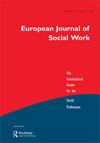Exploring welfare bricolage in Europe’s superdiverse neighbourhoods
IF 1.6
3区 社会学
Q2 SOCIAL WORK
引用次数: 0
Abstract
political and social context. In Croatia, the authors presented the ‘challenges for social work education: lessons from a post-socialist context.’ They divided their presentation into five components to tackle the professional social work profile and education; and then started by stating the history and evolution of the context and the profession of social work describing the synergy between the education and the state intervention, the academic influence, to conclude about the current social work situation. In Latvia, the chapter is about ‘Social work education: post-crisis impact and development.’ The authors presented three main components: the history, the main areas of social work (professional activities, most relevant work areas and triggers and causes of these developments), the current model of social work. In the Netherlands, the authors highlight the ‘Reconstruction of social work education.’ They describe clearly and with a deep understanding the social work profession, history and most importantly the reconstruction of the social work profile. Every paragraph characterises parts of the puzzle that created the profile of social work today in the Netherlands. Starting from the history (citizenship identity, multi-nationalities, challenges), reconstruction, VET and Higher education ethics, relationship to the political aspects, the professional identity, the international profile. In Romania, ‘the revival of Romanian social work education and its prospects’ is the focus. The author presented the history of social work and how throughout the years it evolved, it also presents the main challenges of today’s education, and it also presented the curriculum of the social work academic programme (list of courses, and the pedagogical framework). In the United Kingdom, the social work education was the main theme. The authors provided a general overview about the history of social work, its evolution, and challenges throughout the years. They highlighted the profession of social workers and its operational models within the regions of England, Scotland, Northern Ireland, and Wales. Then, the authors mentioned the development of the profession of Social Work on the Educational, academic, and professional level emphasizing the solution provided to empower the profiles of the social workers.探索欧洲超级多样化社区的福利拼凑
政治和社会背景。在克罗地亚,作者提出了“社会工作教育的挑战:后社会主义背景下的教训”他们将演讲分为五个部分,以处理专业社会工作概况和教育;然后从阐述社会工作的历史沿革和专业背景入手,阐述教育与国家干预、学术影响的协同作用,总结当前社会工作的现状。在拉脱维亚,这一章是关于“社会工作教育:危机后的影响和发展”作者介绍了三个主要组成部分:历史、社会工作的主要领域(专业活动、最相关的工作领域以及这些发展的诱因和原因)、当前的社会工作模式。在荷兰,作者强调了“社会工作教育的重建”他们清晰而深刻地描述了社会工作职业、历史,最重要的是社会工作概况的重建。每一段都描述了当今荷兰社会工作概况的谜题的各个部分。从历史(公民身份、多民族、挑战)、重建、职业教育与高等教育伦理、政治方面的关系、职业身份、国际形象等方面入手。在罗马尼亚,“罗马尼亚社会工作教育的复兴及其前景”是焦点。作者介绍了社会工作的历史以及它在这些年中是如何演变的,它还介绍了当今教育的主要挑战,它还提出了社会工作学术课程的课程表(课程清单和教学框架)。在联合王国,社会工作教育是主要主题。作者概述了社会工作的历史、发展历程以及这些年来面临的挑战。他们强调了社会工作者的职业及其在英格兰、苏格兰、北爱尔兰和威尔士地区的运作模式。然后,作者提到了社会工作专业在教育、学术和专业层面的发展,强调了为增强社会工作者的能力而提供的解决方案。
本文章由计算机程序翻译,如有差异,请以英文原文为准。
求助全文
约1分钟内获得全文
求助全文
来源期刊

European Journal of Social Work
SOCIAL WORK-
CiteScore
3.50
自引率
20.00%
发文量
96
期刊介绍:
The European Journal of Social Work provides a forum for the social professions in all parts of Europe and beyond. It analyses and promotes European and international developments in social work, social policy, social service institutions, and strategies for social change by publishing refereed papers on contemporary key issues. Contributions include theoretical debates, empirical studies, research notes, country perspectives, and reviews. It maintains an interdisciplinary perspective which recognises positively the diversity of cultural and conceptual traditions in which the social professions of Europe are grounded. In particular it examines emerging European paradigms in methodology and comparative analysis.
 求助内容:
求助内容: 应助结果提醒方式:
应助结果提醒方式:


